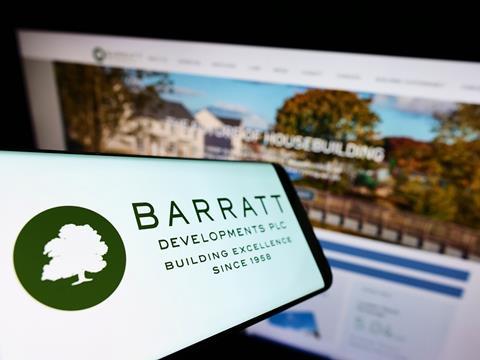But UK’s biggest housebuilder says sales per site per week still 30% down on last year
The UK’s largest housebuilder Barratt has said it is on course to meet reduced volume expectations for the year after sales rates recovered in recent weeks from the mini-Budget turmoil to as high as 0.71 homes per site per week.
However, the £5.3bn-turnover firm said in a trading update its sales rates were still down 30% in the second half of its financial year on 2022, and its pace of construction had dropped significantly to adjust to lower demand.
At Barratt’s half year results in February it said it expected to build between 16,500 and 17,000 homes in the financial year to 30 June, the third time it had reduced expectations since the autumn, and down from the 17,908 homes built by the firm last year.

Chief executive David Thomas said: “Whilst the economic backdrop remains difficult, we are pleased that more positive sales rates have been maintained through this period and we are now fully forward sold for FY23. As a result, we expect to deliver full year adjusted profit before tax in line with current market expectations.”
The firm added that the “trading outlook for the full year remains in line with the Board’s previous expectations with the Group on track to deliver total home completions of between 16,500 and 17,000 homes including around 750 JV home completions”.
In January this year, Barratt had initially said that a rising reservation rate of above 0.50 homes per site per week would allow it to build around 17,475 homes in the full year but the firm is now taking a more cautious view, with volume expected to drop by as much as 8%.
The firm said the value of its forward sales had fallen by 34% to £2.96bn, while the construction build rate had decreased by 16% to see an average of 303 homes completed every week.
With build cost inflation for the current year likely to come in at 9%-10%, Barratt said it now expected cost inflation to reduce next year to around 5%.




























No comments yet